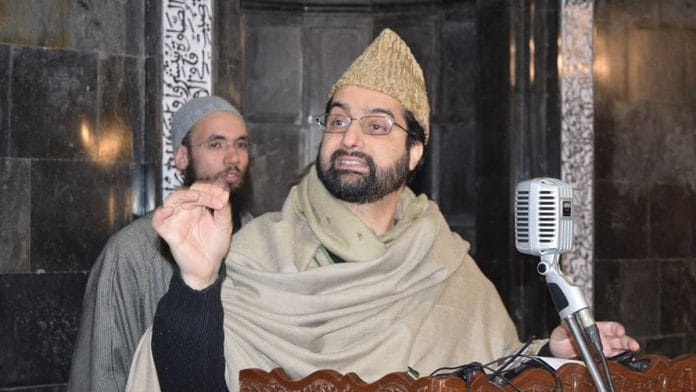New Delhi: Three days after at least 40 CRPF personnel were killed in the Pulwama terror attack, the Jammu and Kashmir government Sunday decided to withdraw the security cover given to five separatist leaders.
The five separatists include Mirwaiz Umar Farooq, the leader of the moderate faction of the Hurriyat Conference, as well as Shabir Shah, Hashim Qureshi, Bilal Lone and Abdul Ghani Bhat. The decision came in the wake of a joint statement made by separatist leaders attributing the Pulwama attack to the “delay in the resolution of the Kashmir dispute”.
ThePrint looks at why these separatists were given security cover, and what its withdrawal means for the precarious relationship between the Indian government and separatists in the Kashmir Valley.
Also read: J&K govt withdraws security cover from Mirwaiz & 4 other separatist leaders
Moderates take cover, hardliners don’t
The Jammu and Kashmir administration offers security cover to separatist leaders on the basis of an independent threat perception by police. For example, Mirwaiz Umar Farooq was offered security cover in 1990 after his father Mirwaiz Maulvi Farooq was assassinated by terrorists.
While most moderate leaders have agreed to take the security cover, the more hardlines ones like Syed Ali Shah Geelani and Jammu and Kashmir Liberation Front chairman Yasin Malik have declined it.
Typically, security cover is offered to moderate leaders who have agreed to hold parleys with the Indian government, although the move is often criticised for draining India’s exchequer to “pamper” separatists who, some say, end up having the best of both worlds.
Crores spent on their security
Last year, responding to a cut motion by Udhampur MLA Pawan Gupta in the state assembly, the J&K government revealed that it had spent Rs 10.88 crore on the security of the separatist leaders. While Rs 10.36 crore were spent on the salary of the policemen guarding the Hurriyat leaders, another Rs 49.7 lakh were spent on the fuel for their vehicles.
According to some reports, the government was providing security cover to only eight separatist leaders as of 2017.
However, it’s not just the separatist leaders who get a security cover from the police. Several thousand political activists also get security from the Jammu and Kashmir administration. In 2015, the Omar Abdullah government had told the assembly that over Rs 506.75 crore were spent on the security cover of 1,472 political activists, including Kashmiri separatist leaders, in the state since 2010.
In fact, in 2016, a PIL was filed by lawyer M.L. Sharma in the Supreme Court, seeking an end to central funding and security given to separatists. More than Rs 100 crore were spent, the PIL argued, on the travel, security and other expenses of separatists, only for them to later use the benefits for “anti-India” activities.
The apex court, however, dismissed the petition, saying the court could not make decisions on what funds were given to whom, as a government was well within its rights to give security cover to citizens facing threats.
Also read: Why the security situation in Kashmir keeps going from bad to worse







Security provided to an individual who faces a genuine threat to his life is not a favour by the state. Barring the loonies on the friendly channels, no one would grudge them this facility. 2. Kashmir is a war zone. No one knows who is working for whom, sometimes for both sides. Indiscreet statements by retired spooks and veterans disclose that secret service funds flow like water, with the handlers likely dipping their beaks a little. This is the dark underbelly of Ekta aur akhandta. 3. At some stage, it is these very “ separatists “ who become part of the dialogue process that leads to lasting peace. Let them die only of old age.